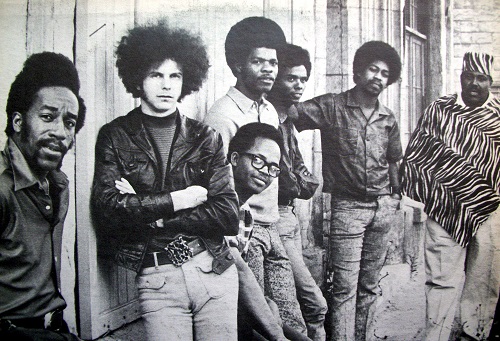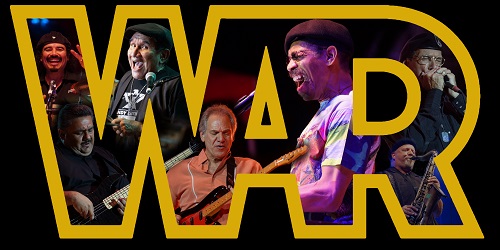50 years ago, one of music’s greatest melting pot collectives released their masterpiece.
The world is a ghetto by War is a groundbreaking six-track work that tells how it was with an awareness and universal understanding that still resonates today. It’s unbridled funk with pointed and direct messages. soul with heart. You can groove to it, but it’s even more important to hear it. In the album’s songs, you get detailed depictions of street life, the thoughts of the downtrodden and laypeople, and raw emotions of people trying to essentially break themselves out of the dirt.
This album became a standout staple for me during the COVID-19 pandemic as there is a common connection between the isolation conveyed on certain tracks and the isolation we all felt globally trying to navigate in uncertain ones Times to stay safe and healthy – even if we couldn’t always control the circumstances. Simply put, this is an album that should be in the pantheon of classics like Marvin Gaye’s What’s happening. It would prove that the seven-piece War (with members from different parts of the world) were in fact a folk band – one of music’s greatest social commentators, offering a good balance of melody and life lessons.
If that’s not enough The world is a ghetto became the best-selling album of 1973.
Where War members Lonnie Jordan (lead vocals and keyboards), Howard E. Scott (guitar), BB Dickerson (bass), Lee Oskar (harmonica), Charles Miller (saxophone), Thomas “Papa Dee” Allen (percussion) and Harold Brown (drums) made their initial fame supporting British animal Eric Burdon (who doesn’t know and enjoy the lyrical phrase “Spill the wine, take that pearl”?). Road to superstardom – which has since culminated in multiple appearances in the Rock and Roll Hall of Fame inductee vote.
“When we got together with Eric Burdon, before we even had our first rehearsals or even our first shows, we were sitting up there in Laurel Canyon with all the hippies and all he was doing was playing us different kinds of blues- play genre. Then he would play rock. And we listened — we spent about three or four months just listening before we even started making music,” Harold Brown told me. “So when we got into the studio, he taught us how to create. When we did The world is a ghetto, we went in and we all sat and started writing… We sat and discussed things about what we were seeing. We made a track and started talking about things that were on our minds, you know.”

The hypnotic, sensual “Spill The Wine” became War’s first major hit, peaking at number 3 on the Billboard Hot 100 in 1970. The next year, with the release of her album Music all day, the group would chart a few more tracks in the top 40, the title track and the smart, funky “Slippin’ Into Darkness.” The latter later became one of the most sampled tracks in rap and hip-hop.
“Most black bands … sounded like that [they were] from Detroit or from Doo-Wop,” Brown said. “We took a different route because when ‘Slippin’ Into Darkness’ came out, it was very different than anything else that was out there.”
For ghetto, War’s fifth album, a new set of influences sparked its creation: the neighboring streets and chameleon-like surroundings outside of Los Angeles; the apparent yin-yang of wealth and poverty; and the unifying thread of multiculturalism included.
“That’s when we began to realize that the world is much more than we thought. We had a saying: “Small money, small problems; big money, big problems; no money, problems, problems,’” Brown told me. “So we started by hanging out in Beverly Hills and Malibu where all the superstars and everyone was hanging out and living. We noticed that they had the same problems as downtown. The toilets would go back. They have flat tires even if they drove a Rolls Royce or whatever. And that’s when Papa Dee came up with this concept – “The world is a ghetto”. We could see that there were many different things that we were all dealing with, issues that made the world a ghetto and how you viewed it and where you were.
The album’s title track, even with its somber lyrical undertones, peaked at number 7 on the Hot 100. Unlike other commercial hits from that year, “The World Is A Ghetto” is explicit in its exploration of societal and inner-city consciousness:
“Walking down the street, smoggy-eyed…
Look up at the sky with bright eyes…
Searching for the place, tired eyes…
crying at night with tears in my eyes.”
“When we did ‘The World Is A Ghetto’ it was more of an arrangement based thing. Papa Dee was trained in classical music. He was about 10, 15 years older than me. He thought more classically. BB Dickerson was the group’s best crooner — he sang the lead,” Brown recalled. “When we were going to sing ‘The World is a Ghetto’ we went to the B-part – it was an A-part, a B-part and a C-part and then back again. It was more of an arrangement. This wasn’t so much a jam; We knew there were certain pieces we had to hit in order to pull off this turnaround.”
But even though the group’s music drew more from the realities of the world, the band members’ chemistry ensured the album’s tracks had the right dose of accessibility. Case in point, album opener and the group’s biggest single hit – the colloquial, groovy tune “The Cisco Kid”.
“‘The Cisco Kid’ was the only non-European or non-white hero on TV that we would watch as kids that we could relate to in any way — because he wasn’t Superman or anything,” Brown said.
“Back when we went into the studio, I loved it. We would rent the studio for a couple of weeks,” adds Brown. “What was really good is that they went in and set it up like we felt right at home in the studio. Inside, the studio was set up so that we could see and communicate with each other. There were a lot of songs that were jams.”
Then there are album tracks that showcase the group’s instrumental prowess. “City, Country, City” would take listeners on a journey that shifts from imaginary traffic and congestion to an expansive grassland and then back again. The progression shifted from funk to soft soul and then back to funk again.
“Four Cornered Room,” on the other hand, speaks more to isolation and the paths the mind takes when confronting its own thoughts (hence the repeated lyrical chorus of “Zoom, zoom, zoom!”).
“I remember we just started with this. I lived up in Silver Lake, California, outside of Hollywood. And I had my square room,” Brown recalls. “You couldn’t afford the high old rent up there, so I rented a small one-bedroom apartment. I had a small fridge with a microwave on top…and [I’m] I sit and think in my square room like we all do now.”
Finally, according to Brown, touring in support of their music would make the reality of the album’s key themes all the more apparent.
“Eventually when we went to Denmark I could see certain things that we could relate to, or if you go to the UK – homeless people sleeping in an alleyway. You’d see it when we were out,” Brown said. “If we went to New York or if we traveled to Atlanta or New Orleans, we could see that the world had its ghettos.”
War would have continued commercial success throughout the 1970s with peppy tracks like “Gypsy Man” and “Low Rider” as well as albums like Deliver the word and Why can not we Be Friends?. The latter album’s title track and its reggae style would speak of collective solidarity and brotherhood. Over the years, however, the band’s dynamic gradually began to crumble, culminating in the group’s dissolution in the 1980s.
Although there are different band factions today — one led by Jordan and another called The Lowrider Band featuring Brown, Oskar and other members — the potential for the group’s induction into the Rock and Roll Hall of Fame remains (the third time might be the appeal ). !) and maybe a group performance that will bring all the surviving members back together.
In any case, it’s important to remember that War’s mastery of global issues and unique musical styles would, for a time at least, surpass other Hall of Famer groups – including Chicago, The Moody Blues and Cat Stevens. The topics are conveyed further via Brown The world is a ghetto just as important in the modern 21st century. The question is what, if anything, needs to be changed?
“Change it from the world being a ghetto; we can make the world more heavenly or better or something. We can’t just run. If you leave, it won’t get better,” he says. “While you’re there, use what you have to make it better.”

***
Share your feedback and suggestions for future columns with Ira at vinylconfessions84@gmail.com. ira’s new book, “Hello, Honey, It’s Me”: The Story of Harry Chapinis available for purchase here.
![]()









